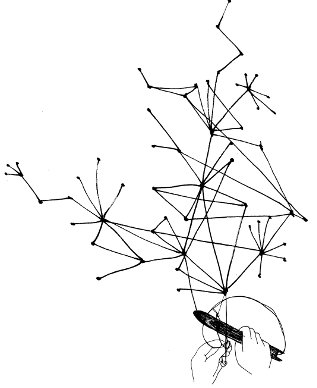FROM NETMENDING TO NETWORKING
Sunday, September 13, 2009

Netmenders are immediately connected to the concept of folklore.
Now we do it industrially, there is no need of preserving this kind of
techniques in order to have sea-nets. Nowadays it’s more convenient to
buy a new one than repair a broken one.
For this reason it's said that technologies are destroying folklore.
It's like saying that we shouldn't live the present
because it leads too far from the past.
Folklore is (in one of the numerous definitions) a word to define
that part of the culture that deals with popular more or less spontaneous
habits and beliefs.
The word was introduced when there was still a strong relationship
with folks, villages etc.
Now that society has changed we find it difficult to apply the term folklore
to contemporary matter.
The Zuiderzee exhibition confirmed this idea.
The contemporary-times involvement wasn't about contemporary folklore,
but about reinterpretation,
modern design inspired by old dutch folklore.
While taste, style and aesthetic values are continuously evolving
human behaviors don't change that much in time, they just adapt.
I think we can find these recursive characteristics on the internet.
And here comes my "involvement".
I found out that just as I've never been into
my country/city traditions, i also (do not) relate
with current habits on the internet.
I'm just geographically connected, trough my ip, to the rest of the network
like a 18th century's person who was not participating to
its village folk's habits and celebrations.
On the other hand, all the people always up to date with memes and myths on the internet,
using social-networks, blogs, forums and chats,
corresponds to the folk of that time.
Different context, different medium of transmission, different people,
same dynamics.
We will see

September 14th, 2009 at 10:52 pm
To get ahead of my research subject, modern folklore, do you think that today’s pop culture and more specifically subcultures are also forms of folklore, or at least contemporary forms of social culture that have a similar function as folklore? If so, I think people now conform as much to phenomena like hipster culture with its second hand, retro fashion, and squatter culture with its black clothes and specific hairdos, as they used to conform to their local traditions in the past. Because of accelerated globalization there might have been a widening of choices that reduces the principality of local culture, but it seems like people still very much conform to group traditions, even though they probably change faster than ever.
Funny side note: In the Newfolk Manifesto that you link to, one of the causes of today’s disregard of folklore, in the academic world at least, is the “newly fashioned field of cultural studies”, the field that I graduated in. So you might not want to take my comment too seriously…
September 17th, 2009 at 9:33 am
You explained this to me the other day and I think it was a bit more clear what you were trying to say.
This text doesn’t make this firm and clear statement that you’ve found this new word called “Netlore” which explains your modern interpretation of what folklore is about.
Or am I wrong?
September 17th, 2009 at 3:57 pm
When I stated before that human behaviors adapt to the context they are living in I meant this.I think virtual dynamics and structures reflect what is happening in the physical world.Finding/creating a group,be influenced by it while changing it. The conformation to more or less implicit conventions of a group/subculture is part of the folklore’s producion process, while the subtle,slow,spontaneous and involuntary process of changing its behavior-influenced by the surrounding context- is what make Folklore to be different in every historical period.
I chose to focus on the internet also because it is the place where all these groups auto-defined themselves and their interaction with the rest. Everything is already mapped,connected, specified.Self-filing.
I didn’t want to criticize social studies trough that link. I just wanted to underline a possible explanation to the position of folklore nowadays. Some of the thematic researched in anthropology and social studies deals with folkloric studies topic.Is nobody’s fault if this happened and i think it is not a problem as far as there is someone interested in the research, it doesn’t matter what’s the name of it and in which faculty is the subject studied.
I guess it’s normal that new students don’t want to be involved in a field that presents itself as small and closed. There’s a need of interdisciplinarity and contemporary cultural studies present themselves more open to all possible interaction with other disciplines.
Anyway It seems to me that the source of all these misunderstandings is in linguistic, problems seem to start when we begin to put too many borders,definitions in the socio-cultural analysis.
Good luck with your research and sorry for complicating things with this meta-discussion
September 19th, 2009 at 2:15 pm
I was still collecting information about this topic when i talked with you. I used anyway the word netlore as a keyword, because it resumes the all thing. But i didn’t want to focus on the linguistic misunderstanding. And the text was becoming too long.
Maybe i will put the things i was writing about it in a link.
September 23rd, 2009 at 7:07 pm
The “meta-discussion” about folklore studies versus cultural studies actually helped me realize that just as cultural studies was born out of research into popular culture, folklore studies might have almost died out because folklore, in the traditional sense of the word, is dying out as well. Its function is being taken over by popular culture and subcultures, and a lot of it takes place online.